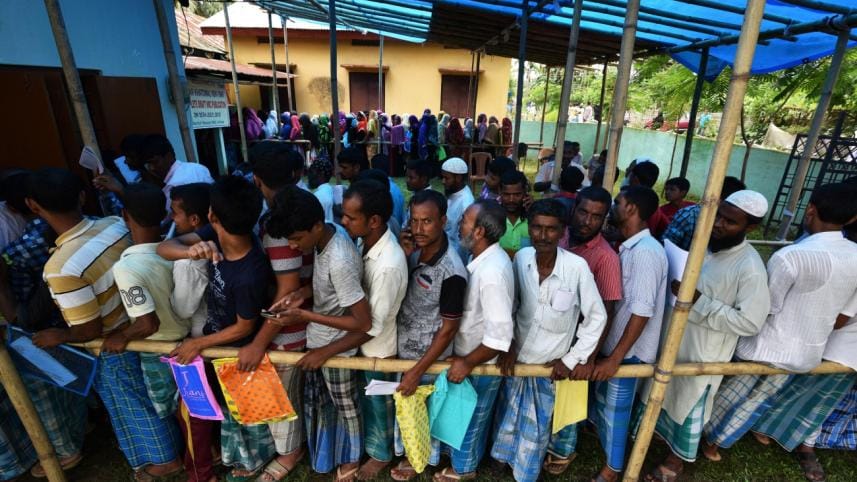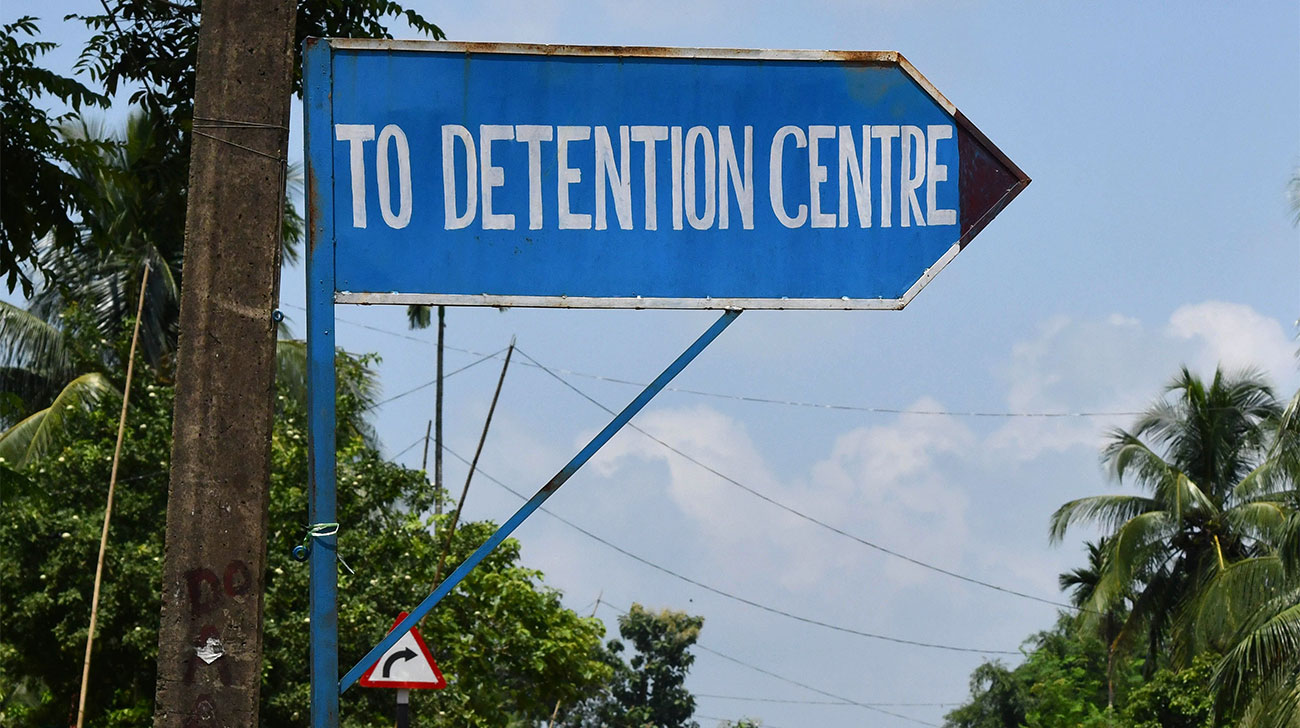What after final NRC?

Now that the final National Register of Citizens in Assam has come out, the lives of more than 1.9 million people excluded from it stand to be affected. They will be looking at an uncertain future. The questions being asked: who the excluded are now and what will be their relationship with India? Will they be declared foreigners and be sent to detention camps for foreigners?
There is no need to paint such an alarmist picture, both Assam and Indian government would tell us. Both have assured the people whose names don’t appear in the final NRC that they cannot be declared foreigners till all legal options are exhausted. But assurances have not done much to help dissipate the acute anxiety among the excluded.
Every person left out of the NRC can appeal to the Foreigners Tribunal, a quasi-judicial body, and the time limit to file the appeal has been extended from 60 days to 120. If he or she is aggrieved by the Tribunal’s ruling, the civil courts like the High Court and then the Supreme Court can be moved. Clearly, a long and tough legal battle lies ahead of the excluded to prove that they are Indians because under NRC rules, the onus is on the excluded to prove their citizenship.
The question is how many people left out of the NRC will take the legal route to get the redressal. The Indian media reports spoke of about seven to eight lakh people, whose names did not figure in the draft final NRC released last year, never made any attempt to get back into the register apparently because of lack of required documents. So, how many will do it now in a state where citizenship documentation culture has traditionally been so weak?
The overriding concern is over the fate of the excluded people and about their rights and if they would retain their right to livelihood. Some BJP leaders had last year suggested that those out of the NRC may not be entitled to own properties but may get work permit. On the political front, do they stand to be disenfranchised? The Indian Election Commission is likely to have a fresh look at the “D” (doubtful) voters in the electoral roll after the final NRC.
What lies at the centre of the whole issue is that of citizenship. Assam is setting up more detention centres exclusively for those declared foreigners, more Foreigners Tribunals to expedite the appeals of those challenging their non-inclusion in the NRC and a central database of people declared foreigners and people who belong to suspect categories after the entire legal battle is over. But their deportation to Bangladesh is extremely unlikely as Bangladesh does not recognise them as their nationals nor do Delhi and Dhaka have a bilateral treaty for this.
There is no confirmation if the authorities in Assam have a roadmap on how to deal with those excluded from the NRC who may fail the legal scrutiny. Second, the Supreme Court has ruled that a convicted foreign national would have to be released from detention centres after three years subject to certain conditions. Again, there appears to be no policy for this category of foreign nationals who have served their sentences and the rights they would be able to avail in the country. Around 1,000 people are still lodged at the centres across Assam who would have to be set free soon. Thirdly, the untraceable category of people who are believed to have migrated from Assam to other parts of India. Fourthly, an estimated 4 lakh people out of the total of over 4 million who were left out of the NRC in the final draft released in July last year did not file claims for inclusion. What would the government do about them?
The BJP-RSS, which had aggressively batted for the NRC till a few months ago, has not only developed a cold feet for the NRC process but is in fact questioning the correctness and fairness of the document. The party is looking at the NRC from its Hindutva prism since there are a large number of Bangla-speaking Hindus left out of the register of citizens. It is also concerned that several people who managed to be part of the final NRC have done so on the basis of allegedly “fake” documents particularly in Muslim-dominated districts bordering Bangladesh. The BJP government tabled NRC data in the assembly on August 1 to drive home the point that the exclusion rate in hinterland districts in Assam has been more than that in border districts.
Senior RSS functionary Shankar Das has told PTI that the register would be “challenged” after it was published. The question then is: what happens if the NRC updation is held constitutionally invalid? Instead, the BJP would prefer to focus more on the implementation of Clause-6 of Assam Accord of 1985 which seeks to provide job reservation and other safety net to the Assamese and reintroduction of the controversial Citizenship (Amendment) Bill to “persecuted non-Muslims from Bangladesh, Pakistan and Afghanistan”.
Assam Chief Minister Sarbananda Sonowal said after a meeting with Indian Home Minister Amit Shah in Delhi on August 19 that the government could consider some legislative measures to delete the “wrongful” inclusion and exclusion of names in the NRC after its final publication. The government has also appointed a committee headed by Justice (retd) Biplab Kumar Sarma that will submit a report on Clause 6 of the Assam Accord within six months.
It is safe to assume that a clearer picture in Assam post-NRC would emerge only after how the legal battle of the excluded plays out and the recommendations of the committee on Clause-6 and the extent to which the BJP would prefer to strike a balance between diverse and, at times, demands of different linguistic and ethnic groups. While the NRC has sharpened the linguistic and ethnic faultlines in Assam, particularly between Bangla-speaking Hindus and Assamese-speaking Hindus, the Citizen’s Amendment Bill brought in a religious divide. As a result, major political parties in the state have repeatedly changed their positions on the NRC.
When the updation of the National Register of Citizens began in 2015 the Tarun Gogoi-led Congress was in power in the state. The political scenario changed by the time its first draft was published on January 1, 2018 as the BJP dispensation under Sarbananda Sonowal came to power in Assam in 2016. Sonowal was the President of All Assam Students Union (AASU), which had spearheaded the six-year long Assam Agitation in 1979-85 to detect and deport illegal Bangladeshi immigrants, before joining the Asom Gana Parishad (AGP), Assam’s former ruling party, and then shifting to the BJP.
BJP President Amit Shah had batted aggressively for implementing the NRC not only in Assam but throughout the country to identify illegal immigrants. He had even compared the situation in the state due to infiltration with that of Jammu and Kashmir. The BJP, he had asserted, is committed to the people to bring in NRC across the country to throw out “all infiltrators.”
The BJP governments both at the Centre and Assam had appealed twice to the apex court for sample re-verification to find out “wrongful” inclusions, especially in districts bordering Bangladesh, and exclusions of persons in the NRC. But the apex court rejected the appeal. The BJP Assam unit chief Ranjeet Kumar Dass has attacked NRC state coordinator Prateek Hajela of undertaking the updation process “unilaterally.”
“Many have told us their names appeared in the first NRC draft list, but went missing from the final draft ... Also there are reports that people who have been declared foreigners were engaged for the NRC citizenship verification work ... It seems we will get an NRC which will include the names of illegal foreigners and exclude genuine Indian citizens,” Dass had told the media earlier this week. But Hajela defended the NRC updating exercise saying it was done with “immaculate accuracy.”
The erstwhile Tarun Gogoi government had initiated NRC updation after the Supreme Court intervened and began monitoring it. In the process, the Congress incurred the wrath of the BJP for having a soft corner for the minority community. Not willing to let go of the opportunity, Gogoi had claimed credit for beginning the NRC updation during his tenure as Chief Minister and boasted that he appointed NRC Coordinator Prateek Hajela. However, he changed his stand after the Congress was voted out of power in 2016 and now vehemently criticises the entire process.
“Neither the Assam government nor the Centre is serious about NRC ... It (the NRC) is going to be a waste paper. The work is not going on as per the Supreme Court’s instructions. If lakhs of genuine Indian citizens are left out, then what is the point of such an NRC?” Gogoi had said in June this year.
In the shifting sands of politics over the NRC lies buried the predicament of close to 2 million left-out people. That should not be lost sight of.

 For all latest news, follow The Daily Star's Google News channel.
For all latest news, follow The Daily Star's Google News channel. 
Comments